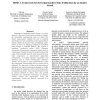274 search results - page 24 / 55 » Protecting location privacy against inference attacks |
132
click to vote
PERVASIVE
2008
Springer
15 years 1 months ago
2008
Springer
Opportunistic sensing allows applications to "task" mobile devices to measure context in a target region. For example, one could leverage sensorequipped vehicles to measu...
131
click to vote
ACSAC
2009
IEEE
15 years 8 months ago
2009
IEEE
Abstract—The traditional virtual machine usage model advocates placing security mechanisms in a trusted VM layer and letting the untrusted guest OS run unaware of the presence of...
116
click to vote
HICSS
2009
IEEE
15 years 8 months ago
2009
IEEE
Detecting and mitigating insider threat is a critical element in the overall information protection strategy. By successfully implementing tactics to detect this threat, organizat...
IEEEARES
2008
IEEE
15 years 8 months ago
2008
IEEE
Careless attention to opening files, often caused by problems with path traversal or shared directories, can expose applications to attacks on the file names that they use. In t...
103
click to vote
CCS
2004
ACM
15 years 7 months ago
2004
ACM
Address-space randomization is a technique used to fortify systems against bu
er over
ow attacks. The idea is to introduce arti
cial diversity by randomizing the memory location o...

